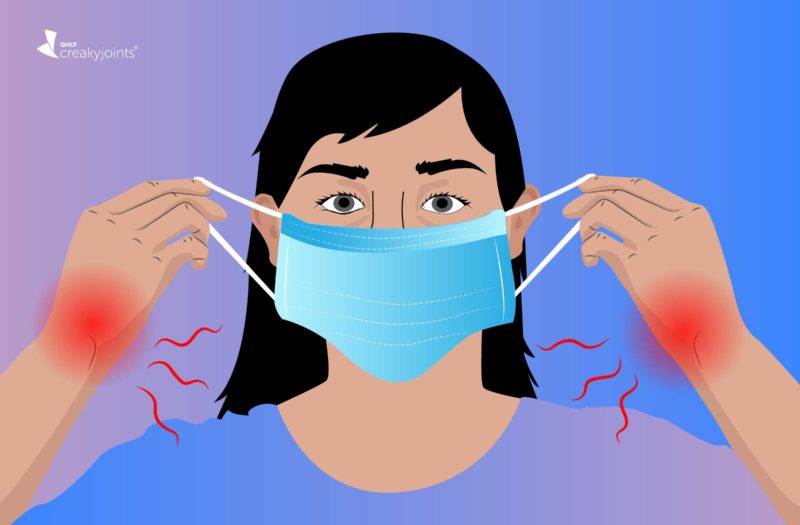Learn more about our FREE COVID-19 Patient Support Program for chronic illness patients and their loved ones.
In the earliest days of the COVID-19 pandemic, public health guidance on face masks was confusing. The U.S. Centers for Disease Control and Prevention (CDC) initially advised everyone (except health care workers) not to wear masks, in part to preserve supplies for front-line workers who needed them most. A month later, they advised that having the public wear masks was indeed a wise move.
While most health experts now agree that widespread mask usage saves lives and is key to managing the pandemic, some skeptics continue to insist that masks don’t work. Research showing that mask mandates likely prevented hundreds of thousands of COVID-19 cases says otherwise.
Another challenge: Until very recently, experts largely encouraged people to wear face masks in order to protect those around them, because it wasn’t clear that cloth face coverings other than N95 respirators would actually protect the wearer.
Many medical centers and health departments have used the slogan, “My mask protects you; your mask protects me,” to explain this concept to the public.
A Shift in Science: Face Masks Protect Wearers and Those Around Them
Now, again, there’s been a shift, as the CDC just updated its guidance to say that cloth masks actually do help protect the wearer, in addition to those around them.
On November 10, the CDC released a scientific brief on community use of cloth masks in which they noted that cloth masks are “primarily intended to reduce the emission of virus-laden droplets,” but that they “also help reduce inhalation of these droplets by the wearer.”
How Wearing a Mask Protects Other People
In terms of protecting others, wearing a mask is especially important if you feel fine, the CDC says. While sick people are likely to stay home because they feel lousy, many asymptomatic carriers (who will never develop COVID-19 symptoms) as well as presymptomatic ones (who feel okay now but will soon develop symptoms) are out in about in the world.
Masks help by reducing the amount of droplets these “healthy” individuals release into the air when they talk, cough, or sneeze.
The fact that many cases of COVID-19 are transmitted among people who do not show symptoms explains the importance of face masks in these circumstances. If you were harboring coronavirus germs and didn’t know it, wearing a face mask when you were out in public would cut down on your ability to spread it to other people.
How Wearing a Mask Protects You
If you’re still wondering, “What’s in it for me?” the CDC says that “studies demonstrate that cloth mask materials can also reduce wearers’ exposure to infectious droplets through filtration, including filtration of fine droplets and particles less than 10 microns” and that some masks made from multiple layers of cloth are “in some cases capable of filtering nearly 50 percent of fine particles less than 1 micron.”
In other words, the efficacy of cloth masks varies based on fabric composition, layers, and fit, but there’s now good evidence that these masks can substantially reduce the amount of viral particles you’ll inhale if you’re exposed to a COVID-19 carrier.
So if you are a healthy person wearing a face mask when you are out in public, the cloth fabric of the mask helps reduce the amount of coronavirus particles you could be exposed to from others. That means you’re far less likely to get sick.
The CDC cited several studies that demonstrate the benefits of mask wearing.
For example, one study of 1,000 people in Thailand who were exposed to coronavirus found that those who said they always wore a mask during “high-risk exposures” were 70 percent less likely to contract the virus.
Get Free Coronavirus Support for Chronic Illness Patients
Join the Global Healthy Living Foundation’s free COVID-19 Support Program for chronic illness patients and their families. We will be providing updated information, community support, and other resources tailored specifically to your health and safety. Join now.
Buchwald E. U.S. health officials say Americans shouldn’t wear face masks to prevent coronavirus. MarketWatch. March 2, 2020. https://www.marketwatch.com/story/the-cdc-says-americans-dont-have-to-wear-facemasks-because-of-coronavirus-2020-01-30.
Scientific Brief: Community Use of Cloth Masks to Control the Spread of SARS-CoV-2. Coronavirus Disease 2019 (COVID-19). U.S. Centers for Disease Control and Prevention. November 10, 2020. https://www.cdc.gov/coronavirus/2019-ncov/more/masking-science-sars-cov2.html.






